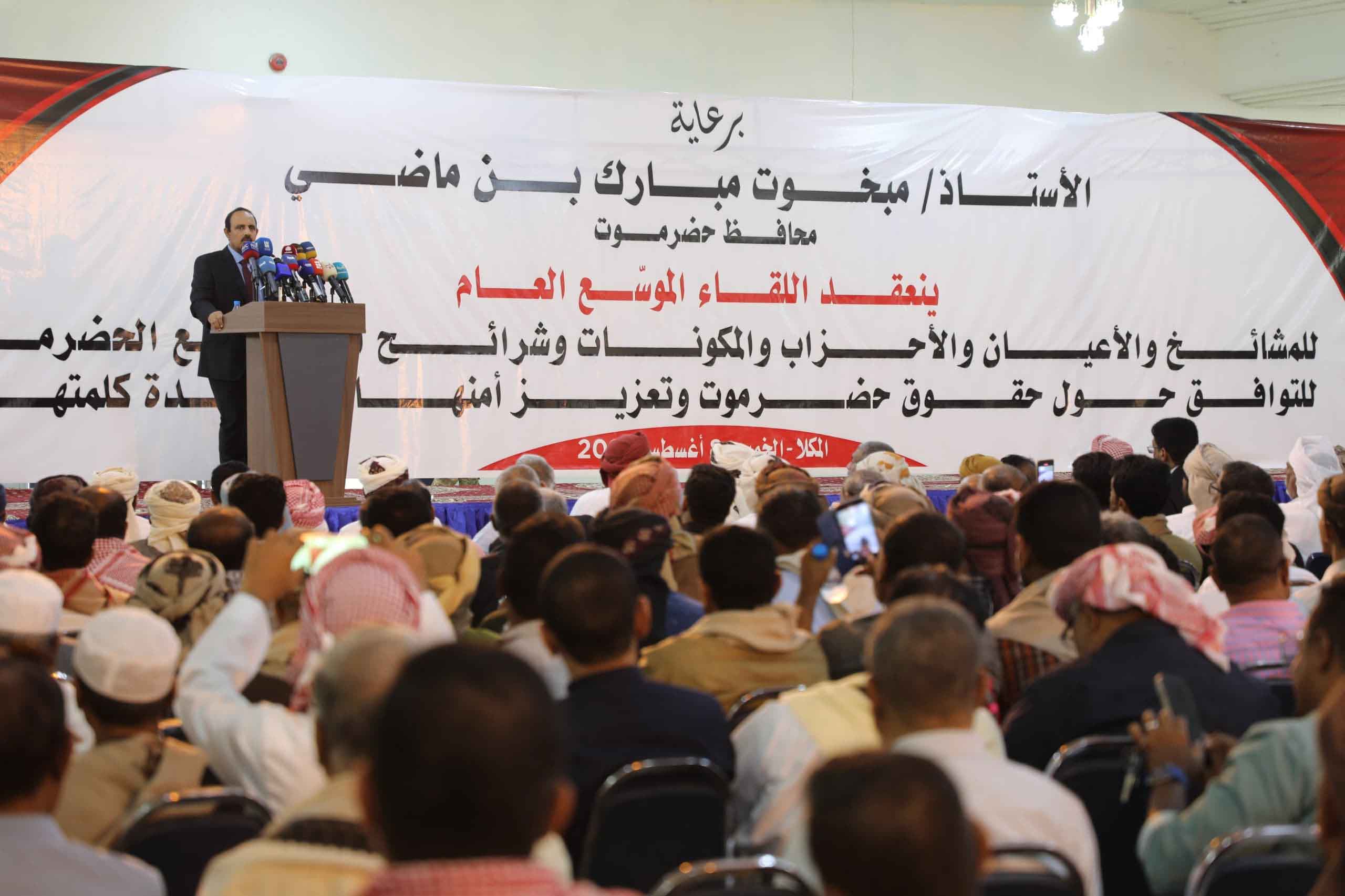


Barran Press
Mukalla, Yemen - Amidst escalating tensions, Hadhramaut Governor Mabkhout bin Maadi held a large-scale meeting on Thursday, August 8th, with representatives from various segments and components of the governorate. This comes as the “Hadhramaut Tribes Alliance” has stepped up its pressure on the Yemeni government, establishing tribal gatherings and checkpoints in the western part of the governorate.
According to the official Yemeni news agency Saba, Governor bin Maadi stated during the meeting in Mukalla that four revenue sources have been cut off from Hadhramaut, in addition to the halt in oil exports. He summarized the most significant challenges facing the governorate.
In this regard, he highlighted the local authority's efforts to overcome these difficulties and improve services, welcoming accountability from official and supervisory bodies.
Governor bin Maadi also announced the nearing completion of a project to build a diesel refinery, which the local authority initiated 20 months ago.
He stated that the refinery will contribute to ensuring the sustainable supply of diesel fuel for the operation of the governorate's power plants, noting that significant resources have been allocated to establish the refinery amid current challenging circumstances, guaranteeing the creation of a strategic project for the governorate.
In his speech, bin Maadi thanked those present from various districts, cities, and coastal, valley, desert, and plateau regions of Hadhramaut, emphasizing the importance of the meeting to unify voices and ranks in order to secure Hadhramaut's rights and the legitimate demands of its people.
According to the agency, participants in the meeting stressed the importance of unity to strengthen the internal front, exercising wisdom, dialogue, consultation, and preserving the blessing of security and safety.
They called for a unified vision, maintaining social peace, security, and stability, emphasizing the importance of reaching consensus on Hadhramaut's demands, unifying voices to achieve them, and prioritizing the governorate's interests and the needs of its citizens.
On Thursday, tribes in western Hadhramaut gathered at tribal gatherings established in the Al-Ubar area, responding to a call from the Hadhramaut Tribes Alliance to escalate pressure against the Yemeni government in demanding the rights of the governorate's people.
Tribal sources told Barran Press that the tribes of Al-Sai'ar, Kanda, Al-Karb, Nahd, Al-Barik, Bani Murra, and Al-Jada'a gathered at tribal gatherings established in Al-Ubar, west of Hadhramaut, in response to the Hadhramaut Tribes Alliance's call for escalation against the government to demand the rights of the governorate's people to wealth and political partnership.
The sources confirmed that the Sai'ar tribes and those with them from the districts of western Hadhramaut set up armed tribal checkpoints on the international road in Al-Ubar district.
Last week, tribal gunmen from the Hadhramaut plateau gathered at tribal gatherings, which they said were in response to a previous call by the Hadhramaut Tribes Alliance, to prevent the export of oil from the governorate until the Presidential Leadership Council and the government respond to the demands of the governorate's people.
The Hadhramaut Tribes Alliance had given the recognized Yemeni government 48 hours to fulfill its demands, which revolve around a “real and effective partnership” regarding the oil reserves in Dhaba port and the Masila field.
In turn, President of the Presidential Leadership Council Rashad al-Alimi described the political demands of the people of Hadhramaut as “legitimate,” affirming the Council's commitment to continuing to address these political demands, which he said are “now represented in central institutions, and today they manage their local affairs in all areas.”
Al-Alimi, in a televised interview with Hadhramaut official television, indicated the Council's and the government's, as well as the local authority's, eagerness to fulfill the legitimate service demands of the people of Hadhramaut and their political and social components.
He stated that the Council and the government support Hadhramaut's demands, and they give them priority and the status they deserve, given their capabilities, as well as their special status as a model for peace, security, and stability, recognition of the other, and a haven for all Yemenis.
Regarding Hadhramaut's share of oil, al-Alimi stated the Presidential Leadership Council's and the government's commitment to the decision to grant the governorate its allocated share of oil export revenues, indicating that “the government will not be content with that, but will strive to give Hadhramaut additional projects if state revenues return and peace and security are achieved in the country.”
In his responses, he referred to attempts to exploit Hadhramaut's demands to obstruct the interests of the people and disrupt security and stability, noting that it is “unacceptable,” in his words.
He said, “Hadhramaut has not accustomed us to obstructing the interests of its people, but on the contrary, it has always been a model of security and stability with all its spectrums and components.”